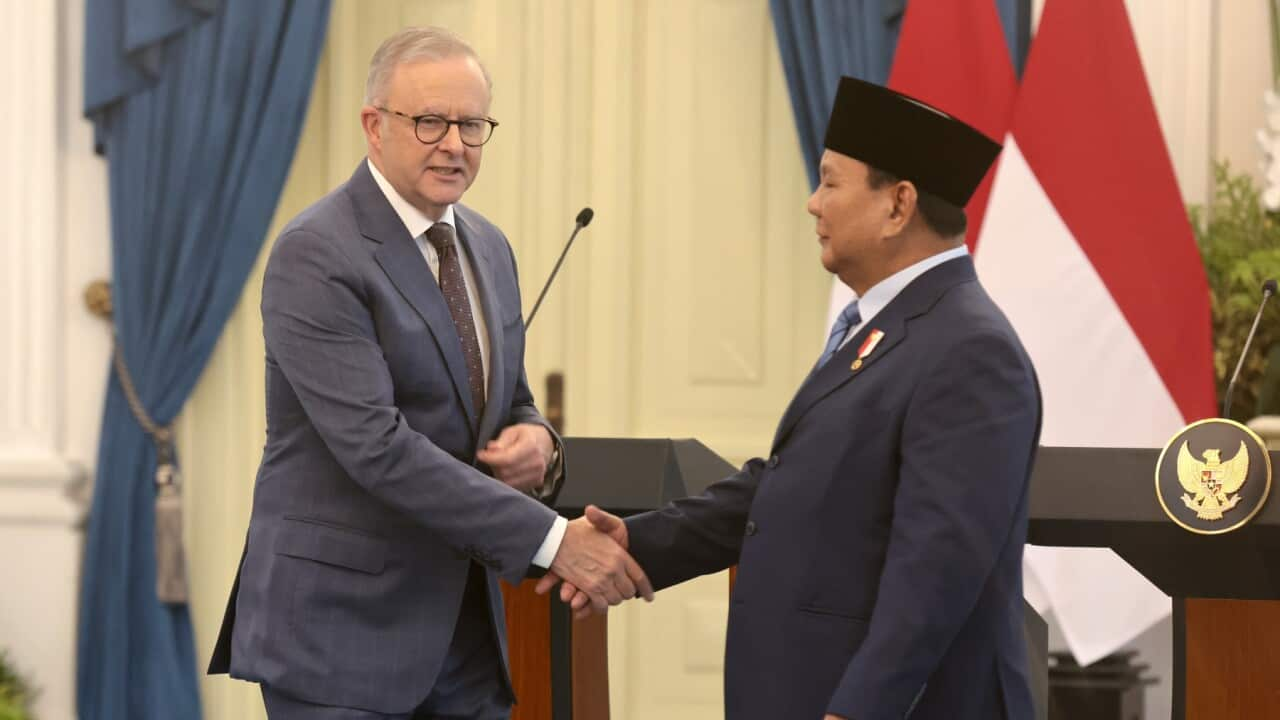TRANSCRIPT
Regional New South Wales resident Belinda Bremner always wanted to travel to China. She hoped to see the Great Wall of China, while visiting a dear friend working in Beijing.
But it’s been tricky for Ms Bremner to apply for a visitor visa.
“The process was huge, the amount of detail that I had to put into the paperwork. But the biggest disadvantage for me was I live about seven-and-a-half hours from Sydney, and as part of the process, I had to go to Sydney (Consulate) to have an interview, and there was no option to have it over the phone or over zoom or anything else, and trying to find the time to be able to do that before I travelled was a huge obstacle for me.”
Just as Ms Bremner was about to give up visiting China, a new announcement from Beijing made her decide to stick with the plan.
In June, Beijing announced it would offer a 15-day visa free entry to Australians, following Chinese Premier Li Qiang’s visit to Canberra. In November, the government extended the visa exemption to 30 days, meaning Australians can now visit and stay in China without applying for visas in advance.
Ms Bremner then booked a ticket to Beijing, where she had a great time with her friends. She also headed to Xi'an to see China's Terracotta Warriors, before leaving for Australia via Shanghai.
She says her sightseeing experience is "absolutely amazing".
“We happen to be there in a little sweet spot of where all the school holidays had finished and students had gone back, but people that wanted to travel outside of school holidays hadn't started travelling. So I'm incredibly fortunate that I've got photos of the Great Wall of China with nobody in the photos, which is quite unheard of.”
Ms Bremner is one of the thousands of Australians heading to China for sightseeing this year, as the relations between the two countries have been warming up since the beginning of trade war in 2020.
Prior to the COVID-19 pandemic, China was one of the top five most popular international destinations for Australian tourists, with around 600,000 Australians heading there in the first six months of 2019.
However, as China implemented COVID lockdown measures, Australian tourists were unable to visit until the beginning of 2023, when China lifted the COVID-zero restrictions and reopened its borders.
Since then, it’s been a very slow recovery, with many international tourists, including those from Australia, hesitant to return.
Eric Wong is a Sydney-based travel agent who’s worked on China tours for 20 years. He says two years since China’s reopening, his sector is still recovering.
“Because the people, when they plan international travel, most people travel or planned one year in advance. So, if you think counting the numbers in September 2023 that's actually for the people who started planning in September 2022, but in September 2022 we're still kind of at the end of the COVID period. So, people wouldn't think of travelling to China yet.”
Mr Wong’s company runs group tours to China that are often within 15 days and says the new visa-free policy has become a relief for both his clients and the company.
“And because of COVID and the changes globally, politically and economically, a lot of people are concerned about travelling to China, but I think this visa-free policy is also a good expression from the Chinese government, saying that they are welcoming the clients from Australia."
Simon Bell, the General Manager of Wendy Wu Tours, which specialises in tours to Asia, also welcomes the extended visa-free policy.
He says when China reopened, it was one of the lowest volume destinations among the Asian countries his company took tours to.
“It's only just now, a couple of years later that we're starting to see meaningful travel return to China. We're very optimistic, and we're very pleased to see that, but it has been a slow, slow start getting travel back to China.”
According to data from the Australian Bureau of Statistics in September 2024, over 45,000 Australians have visited China - a number still much lower than prior to the pandemic.
Mr Bell says at this stage, it’s difficult to quantify the impacts of the visa-free policy on his business, but he’s confident the recovery will continue.
He says China as a tourism destination is not getting enough marketing in Australia.
“China is a huge country that has really varied landscapes, some really exciting places to visit. There's some places in the world which are suffering from overtourism, and we would very much benefit from getting the word out there about what is there to see and do and experience in China, and get that message across to more and more Australians, far and wide, not just in the major cities, but outside of the major cities, to help people put China in consideration of their next holiday. “
For China, getting foreigners back to the country has been on its priority list this year, as the country’s economic slowdown deepens.
Since 2023, China has experienced economic turmoil.
The property crisis which began in 2020 continued to worsen.
The nation’s youth unemployment rate still remains high, despite fluctuations. Despite setting the target of 5 per cent GDP growth this year, China still hasn’t reached the goal, with the newly recorded GDP growth rate being 4.6 per cent.
The country’s ongoing deflation has also led to concerns about the decrease of domestic consumption, and Beijing has to turn to foreign investment to boost the economy.
But it’s not easy for Beijing to do so, because foreign companies are actually leaving China, according to Vicky Xiao Zhou, an ANZ economist in Hong Kong.
“In the recent years, the foreign investment has declined significantly. With China's foreign direct investment, which is FDI, dropping by 29.8 per cent year to date compared to previous year. And we've seen a lot of international businesses such as car makers, Volkswagen, Nissan, have pulled back their China practice. And in August, we also see IBM shut down the China R&D practice. And recent news came out that Starbucks is considering setting stake in China operations. So, this is a very worrying news for China.”
This year, the peak bodies that represent European and US businesses have both released reports on doing business in China, both citing the ongoing geopolitical tensions and China’s tightening regulatory environment have made it difficult for foreign companies to make a profit in China.
According to the American Chamber of Commerce in Shanghai, in 2023, only 66 per cent of American businesses working in China were profitable, which was the lowest figure in the past two decades.
There has also been a drop in the number of foreigners working and staying in China, as the government only issued around 711,000 residence permits in 2023, a 15 per cent decrease compared to 2019.
The COVID restrictions, xenophobia against foreigners and Beijing’s strict control of the private market and political environment have been reported by international media as the reasons why some foreign expats decided to leave China.
But now, Ms Zhou says China is trying to bring foreigners and overseas investment back to the country, and a further opening of international tourism is part of Beijing’s strategy to convince foreign investors to return.
“The more frequent people-to-people exchange will help to China to show the economic power in the global stage. More importantly, under these trade conflicts between EU and the US, the increasing revenue from the service sector would hedge the risk associated with potential trade friction in good exports.”
Ms Zhou also says while international tourism was only worth of 0.3 per cent of China’s GDP in 2023, boosting the sector could allow the government to address unemployment issues, especially among educated young people.
“The World Travel and Tourism Council reports employment in tourism sector in China is still 5 million below its previous peak of 78 million. In China, the average number of employees in the tourism sector is around 30 years old, which is quite young. About 27 per cent of the tourism employees are aged 21 to 25, the increasing number of international tourists could potentially help ease the pressure on youth unemployment rate in China, which stands at 17.1 per cent in October.”
Australia is now one of the 38 countries being included in China’s latest visa-free travel scheme.
But even with the initiative the federal government advises Australians to exercise a high degree of caution in China given local authorities have detained foreigners on the grounds of endangering national security and Australians may be at risk of arbitrary detention or harsh enforcement of local laws.
A spokesperson for the Department of Foreign Affairs and Trade also told SBS News that it recommends Australians read and subscribe to its travel advice for China.
The spokesperson also says they know the extension of China’s visa-free policy will mean a lot to Australians with family, friends and business connections in China.
Besides legal concerns, the rapid digitalisation in China, especially mobile payments, have been reported to be another reason that discourages potential foreign visitors from visiting China.
While China has loosened the restrictions for foreigners to register their mobile payment accounts, China's blocking of major western social apps could still be inconvenient for some.
But for regular China visitor Andrew Scrimgeour - who's planning to visit China next year by using the visa-free initiative - these challenges could all be easily solved.
“Do your homework. Make sure that you've got an Ali pay or a WeChat pay. Make sure it's linked to your credit card, make sure that you know how to book a train ticket, and make sure you always have your passport with you. You've just got to have those few basic functioning digital forms of negotiation, and you can and the world is your oyster.”













